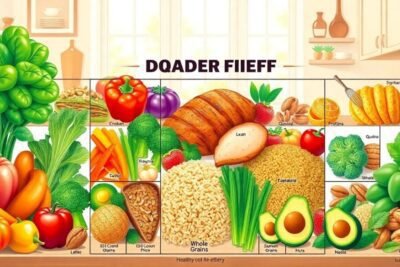
How to lower blood pressure by fasting: A comprehensive guide
Fasting has gained prominence as a potential strategy for managing various health conditions, including hypertension and diabetes. Understanding how to lower blood pressure by fasting can offer significant benefits for those struggling with these issues. This guide aims to provide valuable insights into fasting and its implications for blood pressure management.
Fasting not only influences weight but can also affect blood pressure and overall cardiovascular health. Before undertaking any fasting regimen, it’s essential to consult medical professionals to tailor an approach that is both safe and effective.
- What should you know about fasting to lower blood pressure?
- How long to fast to reduce blood pressure?
- What kind of fasting helps your blood pressure?
- Can intermittent fasting cause high blood pressure?
- How does fasting affect blood pressure medication?
- What are the risks of fasting for hypertensive patients?
- Related questions about fasting and blood pressure management
What should you know about fasting to lower blood pressure?
Fasting can lead to various physiological changes that positively affect blood pressure. When you fast, your body goes through metabolic shifts that can promote better heart health. Understanding these changes is crucial for effective blood pressure management.
Intermittent fasting, in particular, has shown promise as an approach to lower blood pressure. Studies suggest that this method can enhance insulin sensitivity and reduce inflammation, which are both beneficial for cardiovascular health. It’s important to note that fasting should be done cautiously, especially for individuals with underlying health conditions.
Moreover, hydration plays a vital role during fasting periods. Many people underestimate the importance of staying adequately hydrated, which can significantly affect blood pressure levels. Prioritizing hydration is crucial for anyone considering fasting.
How long to fast to reduce blood pressure?
The duration of fasting can vary based on individual health needs and goals. Research indicates that even short-term fasting can lead to improvements in blood pressure. For some, a 16-hour fast may suffice, while others may benefit from longer fasting periods.
A popular method is intermittent fasting, which involves cycling between eating and fasting. Common protocols include the 16/8 method, where you fast for 16 hours and eat within an 8-hour window. This approach can be particularly effective for lowering blood pressure.
Additionally, studies have pointed out that extended fasting, under medical supervision, can lead to significant drops in blood pressure. However, this should only be attempted with professional guidance to mitigate risks.
What kind of fasting helps your blood pressure?
Different fasting methods may have varying effects on blood pressure management. Here are some effective options:
- Intermittent fasting: Involves regular cycles of eating and fasting, promoting metabolic health.
- Water fasting: Consists of consuming only water for a specific period, which has shown promising results in lowering hypertension.
- Alternate-day fasting: Involves alternating between fasting days and regular eating days to enhance weight loss and blood pressure control.
- Time-restricted eating: Similar to intermittent fasting, this method restricts food intake to certain hours of the day.
Incorporating these fasting techniques into your lifestyle can lead to better management of blood pressure levels. However, prior medical consultation is essential.
Can intermittent fasting cause high blood pressure?
While intermittent fasting is generally beneficial for blood pressure, it can potentially lead to temporary spikes in some individuals. This may occur due to stress or inadequate nutrient intake during fasting periods. Listening to your body is crucial.
Individuals with pre-existing hypertension should monitor their blood pressure closely when starting fasting. If you notice any adverse effects, it’s vital to consult a healthcare provider to adjust your fasting strategy accordingly.
In some cases, inadequate hydration or electrolyte imbalance during fasting can lead to increased blood pressure. Ensuring proper hydration can help mitigate these risks.
How does fasting affect blood pressure medication?
Fasting can significantly impact how your body metabolizes medications for hypertension. It’s essential to have an open dialogue with your healthcare provider regarding your current medication regimen before beginning fasting. Adjustments may be necessary based on your fasting plan.
Some medications may require food intake to optimize absorption, which could present challenges during fasting. In these cases, your doctor might suggest timings for medication that align better with your fasting schedule.
Additionally, as blood pressure readings may fluctuate during fasting, regular monitoring is crucial. Keeping track of your blood pressure can help ensure that your medication remains effective and safe throughout the fasting periods.
What are the risks of fasting for hypertensive patients?
While fasting can offer several benefits, it also carries risks, particularly for individuals with hypertension. Some of the potential risks include:
- Dehydration: Fasting can lead to decreased fluid intake, exacerbating hypertension issues.
- Electrolyte imbalance: Prolonged fasting can result in imbalances that may affect heart health.
- Increased stress levels: Some individuals may experience stress, which can temporarily raise blood pressure.
- Medication complications: Adjusting medications without professional guidance can lead to adverse effects.
To minimize these risks, it's essential to approach fasting carefully. Consulting healthcare professionals and monitoring your health regularly can help ensure a safer fasting experience.
Can you lower blood pressure by fasting?
Yes, fasting can help lower blood pressure for many individuals. By promoting weight loss and reducing inflammation, fasting can lead to significant improvements in cardiovascular health. It’s important, however, to follow a structured fasting plan and consult with healthcare providers to maximize these benefits.
What are the fasting benefits for blood pressure management?
Fasting can offer several benefits for managing blood pressure, including:
- Weight loss, which is crucial for hypertension control.
- Improved insulin sensitivity.
- Reduced inflammation, contributing to better heart health.
- Lowered stress levels, particularly with mindful fasting practices.
These benefits can lead to a more favorable blood pressure profile when fasting is done correctly and safely.
What are safe fasting techniques for hypertension patients?
Hypertensive patients should consider safe fasting techniques such as:
- Supervised fasting programs: Engaging in medically supervised fasting can ensure safety and effectiveness.
- Intermittent fasting: A structured approach allows flexibility while promoting health benefits.
- Gradual fasting: Starting with shorter fasting periods can help the body adapt.
Always consult with healthcare professionals before embarking on a fasting journey to ensure it aligns with your health needs.
How can intermittent fasting and blood pressure control work together?
Intermittent fasting can be a powerful tool for blood pressure control. This method encourages the body to use stored fat for energy, which can lead to weight loss and a decrease in blood pressure. Moreover, the metabolic benefits associated with intermittent fasting can enhance cardiovascular health over time.
Are there dietary recommendations for fasting?
When fasting, it’s important to focus on a balanced diet during eating periods. Incorporating plenty of vegetables, healthy fats, and lean proteins can support heart health. Additionally, reducing sodium intake can further assist in managing blood pressure effectively.










